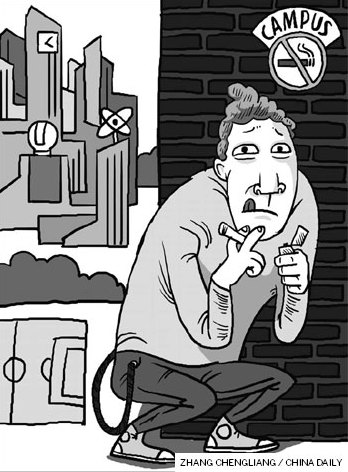Voices
School smoking culture needs to be stubbed out
By Ben Lim Chiow Ang (China Daily)
Updated: 2010-07-27 07:51
 |
Large Medium Small |

I read with great interest in a recent report that a nationwide ban on smoking in schools went into effect on July 13.
Students are beginning their months-long summer holidays and the new school term won't commence until September 1, so the new ban has had little practical effect so far. It remains to be seen if the directive can effectively be translated into actions.
The smoking ban in institutions of learning is long overdue. You don't have to be rocket scientist to know that a school is a place where students are inculcated with the right values. Smoking certainly has no place on school premises.
In my early years back in 2003 as an educator at a Beijing vocational school, it was a rude awakening for me when I witnessed first-hand smoking buddies having their "smoking break" in the toilet during the interval between classes.
It made answering the call of nature an unpleasant experience for me as I invariably ended up admonishing the recalcitrant students to snuff out their cigarettes.
A foreign colleague of mine couldn't bear it any longer and reported it to the disciplinary section of the school. To his bewilderment, the disciplinary mistress said nonchalantly that smoking is part of the local culture and there is not much the school can do about it.
In subsequent years, I came to appreciate the words of the disciplinary mistress about smoking being a cultural aspect of China, although I continued to disagree with her lack of action.
Smoking is deep-rooted in Chinese culture and there is still a general lack of awareness about its impact on health. Employees in the State-owned enterprises are used to giving tobacco as gifts to their superiors - a longstanding tradition in China's office culture. The majority of the 350 million smokers in China are males, influenced by the idea that smoking is macho.
I was told that smoking in China was used to bridge the social divide between the 'haves' and 'have nots'. By offering a cigarette to a fellow acquaintance or stranger, subconsciously the two would have established a bond as both of them now have a "common interest".
The school where I now work, seven years later, did something concrete to prevent smoking and stationed a male teacher outside the toilets during the intervals between classes. But it has so far proved a futile exercise as students continue to light up the cigarettes inside the toilet without punishment. I suspect the teacher may have lost his olfactory senses.
Schools' disciplinary department will have their work cut out for them. In my view, schools in China need a three-pronged strategy to successfully execute the smoking ban.
There should be ongoing educational talks by the school to the students on the harmful effects of smoking. The talks could be reinforced through student participation in photography competitions, essay writing competitions, graffiti drawing, logo designs, and impromptu speeches, focusing on the harmful effects of smoking.
Enforcement should go hand-in-hand with the above educational talks. The schools must draft the rules to enforce the smoking ban with severe penalties for the non-compliant students and teachers alike.
Here in China, my observation is that lack of regulations and rules are not the most crucial issue. Instead it is enforcement, or rather lack of it, that is the chief culprit of many social ills in China.
Schools must be strict and transparent in their enforcement of the ban. They should raise the visibility of punishment being meted out to recalcitrant student. This will serve as a strong deterrent to others.
There should be follow-up action by the school after it punishes smokers caught breaking the ban. We should recognize that smoking is an addictive behavior and smokers need help to quit.
Schools should have anti-smoking clinics. If an individual school does not have the resources for such a clinic it could cooperate with similar schools nearby to share resources and establish a jointly operated clinic.
It is a no-brainer that the above three strategies will only work if there is a strong political will by the heads of schools. The leadership shown by principals is paramount in successfully executing the smoking ban.
If implemented half-heartedly the smoking ban in schools will only perpetuate cynicism amongst Chinese and foreigners alike.
Cultural phenomenon or otherwise, smoking has no place in schools with impressionable students.